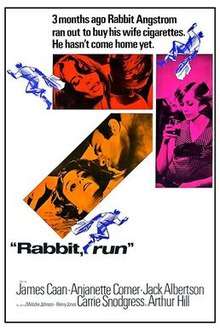Rabbit, Run (film)
Rabbit, Run is a 1970 American independent film directed by Jack Smight. The film was adapted from John Updike's 1960 novel by screenplay writer Howard B. Kreitsek, who also served as producer. The film starred James Caan as Rabbit Angstrom, Carrie Snodgress as Rabbit's wife Janice, and Anjanette Comer as his girlfriend Ruth. The movie co-starred Jack Albertson as Coach Marty Tothero, Arthur Hill as Rev. Jack Eccles, and Henry Jones and Josephine Hutchinson as Rabbit's parents.[1][2][3]
| Rabbit, Run | |
|---|---|
 Theatrical release poster | |
| Directed by | Jack Smight |
| Produced by | Howard B. Kreitsek |
| Screenplay by | Howard B. Kreitsek |
| Based on | Rabbit, Run by John Updike |
| Starring | James Caan Carrie Snodgress Anjanette Comer Jack Albertson Arthur Hill Melodie Johnson Henry Jones Josephine Hutchinson |
| Music by | Ray Burton Brian King |
| Cinematography | Philip H. Lathrop |
| Edited by | Archie Marshek |
| Distributed by | Warner Bros. |
Release date |
|
Running time | 94 minutes |
| Country | United States |
| Language | English |
Plot
In Reading, Pennsylvania, former high school basketball star Harry "Rabbit" Angstrom is dissatisfied with both his failure to find a career and with his loveless marriage to Janice, an alcoholic who is pregnant with a child neither of them wants. Following an argument with Janice, Rabbit looks up his old basketball coach Marty Tothero, who is now living in squalor. Marty decides that Rabbit needs a woman, and he introduces him to Ruth, a part-time prostitute. When Rabbit moves in with Ruth, Jack Eccles, the family minister, tries to persuade him to return to his wife, but Rabbit refuses.
Eventually, Rabbit also becomes disenchanted with Ruth, and when Janice has her baby, Rabbit goes to the hospital and effects a reconciliation. For a time, they live in relative harmony, but Janice's insistence on a less active sex life leads to bitterness, and Rabbit again takes off. Janice resumes her solitary drinking, this time with tragic results; while in a drunken stupor, she accidentally drowns the baby. Learning of his child's death, Rabbit returns home and finds that everyone holds him responsible.
At the funeral, Rabbit responds to his parents' and in-laws' accusing glances by screaming his innocence. Fleeing from the cemetery, he goes to Ruth's apartment; but Ruth, who is now pregnant with his child, refuses to let him in unless he agrees to divorce Janice and marry her. Although he promises to do so, Rabbit is still unable to make a commitment to anyone and runs away again.
Cast
- James Caan as Harry "Rabbit" Angstrom
- Carrie Snodgress as Janice Angstrom
- Anjanette Comer as Ruth Leonard Byer
- Jack Albertson as Marty Tothero
- Arthur Hill as Rev. Jack Eccles
- Melodie Johnson as Lucy Eccles
- Henry Jones as Mr. Angstrom
- Josephine Hutchinson as Mrs. Angstrom
- Don Keefer as Mr. Springer
- Carmen Matthews as Mrs. Springer
- Nydia Westman as Mrs. Smith
- Marc Antony Van der Nagel as Nelson Angstrom
- Virginia Vincent as Margaret
- Sandra Scott as Miriam Angstrom
- Margot Stevenson as Mrs. Tothero
- Ken Kercheval as Barney
Marketing
The film, which was released by Warner Bros., had its world premiere in Updike's hometown of Reading, Pennsylvania on 28 October 1970.[3] The film poster reads, "3 months ago Rabbit Angstrom ran out to buy his wife cigarettes. He hasn't come home yet."[4]
The reception by the Reading audience was poor and Warner Bros. aborted a wide release for the film, which didn't even play in New York City. As late as 1973, John Updike was still hoping that Warners would reshoot scenes he considered weak and re-release the film.[5][5]
References
- Rabbit, Run on IMDb
- New York Times Movies entry for the film adaptation
- "Rabbit, Run (1970)". Turner Classic Movies. Retrieved 3 February 2014.
- The Internet Movie Poster Awards: Rabbit, Run
- Negley, Erin (18 March 2007). "'Rabbit,' lost: The film version of John Updike's "Rabbit, Run," gave Reading a rare moment in the Hollywood spotlight, but finding the movie today is just about impossible". Reading Eagle. Retrieved 3 February 2014.